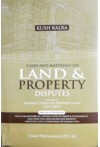- Author(s): Kush Kalra
- Publisher: Vinod Publications (P) Ltd.
- Edition: 2 Ed 2025
- ISBN 13 9789395939560
- Approx. Pages 980 + Contents
- Format Hardbound
- Approx. Product Size 24 x 16 cms
- Delivery Time 3-5 working days (within Kerala & South India) (Others 7-9 days)
- Shipping Charge Extra (see Shopping Cart)
......................................................................................................................................
Description
The term 'property' has been used in a variety of senses. In its wider sense, property includes all the legal rights of a person of whatever description. The property of a man is all that is his in law, exclusion of others is the life essence of property. In this regard, Blackstone noted that property means, "the inferior hath no kind of property in the company, care or assistance of the superior, as the superior is held to have in those of the inferior". According to Hobbes, "of things man have are his own life and limbs, and in the next degree, in most men, those that concern conjugal affection and after them riches and means of living". John Locke holds that, "every man has a property in his own person" and a man has a right to preserve property that is his life, liberty and estate". Jeremy Bentham argues that, "property and law are born and must die together. Before the laws, there was no property: take away the law, all property ceases".
In a narrower sense, property includes the proprietary rights that constitute an individual's estate or property; and the personal rights that constitute his status or personal condition. In this sense, the land, chattels, shares and debts due to a person are his property; but not his life or liberty or reputation.
In the narrowest use of the term, property includes nothing more than corporeal property or the right of ownership in material things. Consequently, patent, copy rights which are incorporeal, are excluded. According to Austin, the term property is sometimes used to denote the greatest right of enjoyment known to the law excluding servitudes.
......................................................................................................................................
Table of Contents
Part I
Chapter 1. Introduction
Chapter 2. Adverse Possession
Chapter 3. Mutation
Chapter 4. Partition of Immovable Properties
Chapter 5. Pre-Emption Rights
Chapter 6. Sale of Immovable Peoperty
Chapter 7. Rights and Liabilities of Buyer and Seller
Chapter 8. Mortgage
Chapter 9. Women's Right to Property
Chapter 10. Suits by Person Dispossessed of Immovable Property
Chapter 11. Suits for Injunctions
Chapter 12. Suits on Easements
Chapter 13. Land Aquisition
Chapter 14. Real Estate Sector and Disputes
Chapter 15. Model Forms
Part II. Supreme Court on Property Laws (2015 to 2025)
. Adverse Possession
. Agreement to Sell
. Civil Procedure Code
. Transfer of Property Act, 1882
. Hindu Succession Act, 1956
. Indian Succession Act, 1925
. Injunction
. Land Aquisition Act, 1894
. Land Laws
. Mutation
. Power of Attorney Act, 1882
. Property Law
. ram Janambhumi (Ayodhya Case)
. Registration Act, 1908
. Right to Fair Compensation and Transparency in Land Acquisition, Rehabilitation and Resettlement Act, 2013
. Specific Relief Act, 1963
. Waqf Act, 1995
. Supreme Court Latest Case Laws
. Adverse Prossession
. Agreement to Sell
. Andhra Pradesh Tenancy (Andhra Area) Act
. Appeal
. Arbitration and Conciliation Act, 1996
. Benami Act
. Civil Procedure Code, 1908
. Code of Criminal Procedure, 1973
. Constitution of India
. Contract Act, 1872
. Delhi Rent Control Act, 1958
. Evidence Act, 1872
. Hindu Law
. Hindu Succession Act, 1956
. Injunction
. Property Law
. Registration Act
. Rent and Eviction
. Specific Relief Act, 1963
. Suits Valuation Act, 1887
Transfer of Property Act, 1882
......................................................................................................................................
Author Details
Kush Kalra holds the Limca Book of record for writing most books
in a year. His areas of interest are Constitutional Law, Criminal Law
and Arbitration. A recipient of the National Youth Award by the Ministry
of Youth Affairs and Sports, he believes that education can make a big
difference and improve our lives.

